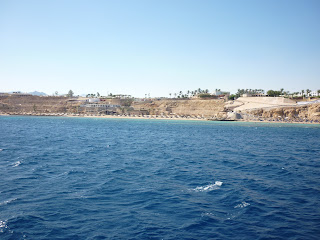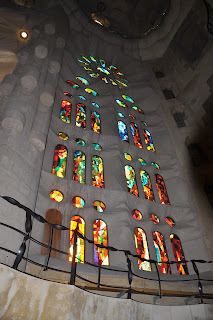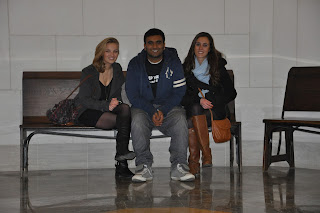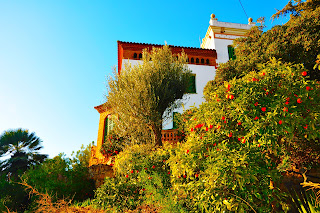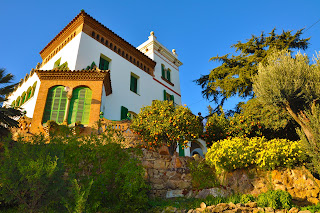Short film which is based on the work of a Landscape Architect:
http://www.iwanttobealandscapearchitect.com/
Discover landscape architecture the creative profession which combines art, science, design and the environment.
Sunday, 26 August 2012
Thursday, 23 August 2012
Douglas J. Meehan Work
A well presented, website which presents Landscape Architecture, Urban design and Digital media.
Worth having a look in the way in he has chosen to present his work. Amazing!
Please click on link below:
http://www.level0design.com/work/disciplines/landscape-architecture/
Worth having a look in the way in he has chosen to present his work. Amazing!
Please click on link below:
http://www.level0design.com/work/disciplines/landscape-architecture/
Monday, 20 August 2012
The importance of landscape architecture
Landscape architecture is one of the world's most important professions.
Neglecting the architectures of the world's fast-changing landscapes will result in endless highways lined with endless blocks of endless tedium - dreary expanses of housing, industry, forestry and agriculture - our natural landscapes buried under repetitive building and planting. Instead, we should design the architecture of 'new landscapes for our new lives' (Fairbrother, N. 1970). The engineering of anti-landscapes should make way for an enlightened landscape architecture. With the death of engineer's modernism, it is time for a twenty-first century approach.
Landscape architecture theory
Landscape architecture and garden design are separate arts with a shared and ancient heritage. The distinction is that gardens are usually enclosed and private. Landscape architecture is concerned with public goods and public spaces. Societies require landscape architectural policies for each land use category - to conserve what has value and and to create new public goods.
Sunday, 19 August 2012
Design Competitions:
World landscape architecture presents a serious of design ideas, This particular link below is based on the :
http://worldlandscapearchitect.com/tag/design-competition/#.UDz0gGie7ok
I think throughout our time in studying or even becoming Landscape architects, it is important that we keep an open view on how designs are changing through time, and by either being part of a competition or even by being aware of others work,
will influence and develop our own ideas.
2012 London Olympics Legacy | South Park | James Corner Field Operations
http://worldlandscapearchitect.com/tag/design-competition/#.UDz0gGie7ok
I think throughout our time in studying or even becoming Landscape architects, it is important that we keep an open view on how designs are changing through time, and by either being part of a competition or even by being aware of others work,
will influence and develop our own ideas.
Thursday, 16 August 2012
American Society of Landscape Architecture
This intriguing website, takes you step by step of the design process, a well layout out and appealing website, will make you understand the process. Check the link to find out exactly what needs to be done and the stages:
http://www.asla.org/design/#designprocess
http://www.asla.org/design/#designprocess
Wednesday, 15 August 2012
Modern approach to Landscape Architecture
Here is a link that shows you the top ten modern landscape architecture, including the famous high line and many more,
It is worth having a look into the new modern landscape architecture:
click on link below
http://www.thecoolist.com/landscape-architecture-designs-10-modern-masterpieces/
It is worth having a look into the new modern landscape architecture:
click on link below
http://www.thecoolist.com/landscape-architecture-designs-10-modern-masterpieces/
Tuesday, 14 August 2012
Landscape architecture: Making a place of Art
I came across this short text book on: Landscape Architecture : Making a place of Art by Catherine M. Howett, it is an interesting, illustrated article on how Landscape architecture is impacting on the making a place of art in our surrounding. Please click on link below to read. Very interesting.
http://places.designobserver.com/media/pdf/Landscape_Arch_530.pdf
http://places.designobserver.com/media/pdf/Landscape_Arch_530.pdf
Saturday, 11 August 2012
Surrey Quays.
Big Pete Monster Truck Show took place at Surrey Quays....
It was interesting to see this event take place in Surrey Quays, as I also designed a wooden car landmark in the parking slots....
Monday, 6 August 2012
Thames Barrier Park
I got the chance to go to Thames barrier park, and it was phenomenal. The space and the landscape within was quite interesting.
It is intended to aid the regeneration of the area by creating an attractive public space alongside residential and commercial developments.
It is intended to aid the regeneration of the area by creating an attractive public space alongside residential and commercial developments.
Friday, 3 August 2012
Stonehenge
I recently visited Stonehenge in Wiltshire England. I was amused at the sight and the they way in which the structure has to this day held himself. Below is some further research in which i have done, followed by some of my photography of Stonehenge...
Stonehenge is probably one of the most recognisable monuments in the world. The 5000 year old henge monument became a World Heritage Site in 1986 and is managed by English Heritage. Despite years of research and study the reason behind the construction of Stonehenge remains a mystery...
People continue to wonder just why Stonehenge was built with some suggesting it was used as a giant astronomical observatory. In truth, it's fair to say that we're as much in the dark as we've always been.
My personal photographs of the mysterious Stonehenge:
Stonehenge is probably one of the most recognisable monuments in the world. The 5000 year old henge monument became a World Heritage Site in 1986 and is managed by English Heritage. Despite years of research and study the reason behind the construction of Stonehenge remains a mystery...
People continue to wonder just why Stonehenge was built with some suggesting it was used as a giant astronomical observatory. In truth, it's fair to say that we're as much in the dark as we've always been.
My personal photographs of the mysterious Stonehenge:
I advise anyone that gets a chance to go and visit Stonehenge that, it's truly fascinating, and this dark mystery behind this place creates endless theories and possibilities. Worth the visit!
Monday, 30 July 2012
Manipulation of landscape photography.
Whose to say that what we see and capture is all we can see... ones imagination can take the image in a whole different level, with a vast depth and curiosity which takes seeing in a whole different level.
Below is a wonderful website i found of magnificant landscape manipulation photography, please view the link below to see for yourselves...
25-absolutely-magnificant-landscape-photo-manipulation
Below is a wonderful website i found of magnificant landscape manipulation photography, please view the link below to see for yourselves...
25-absolutely-magnificant-landscape-photo-manipulation
Saturday, 28 July 2012
Can you identify the historical landmarks?
Here is something I came across, and it's interesting to know how much you really know about the famous landmarks.
Belo is the link of a quiz which you can take, it only takes a few minute, to reveal you knowledge of historical landmarks.
Please click on the link below:
http://www.proprofs.com/quiz-school/story.php?title=How-well-do-you-know-famous-countries-landmarks
Its easy! give it a go :)
Belo is the link of a quiz which you can take, it only takes a few minute, to reveal you knowledge of historical landmarks.
Please click on the link below:
http://www.proprofs.com/quiz-school/story.php?title=How-well-do-you-know-famous-countries-landmarks
Its easy! give it a go :)
Thursday, 26 July 2012
Landscape Architecture: London Olympics
LDA Design • Hargreaves Associates will develop detailed proposals for the open spaces in the Olympic Park both during and after the Games. They will create a new kind of park that promotes sustainable and active living.
http://www.london2012.com/news/articles/2008/3/olympic-park-landscape-architects-appointed.html
http://www.london2012.com/news/articles/2008/3/olympic-park-landscape-architects-appointed.html
Sunday, 22 July 2012
Landscape images from my holiday to Egypt:
Artificial man made beaches, Sharm El Sheikh
Ship wreck, on a coral reef. Off the coast of Sharm El Sheikh.
Sitting area within a pond, with bridge crossing. Soho Sqaure, Sharm El Sheikh
Thursday, 19 July 2012
(In)visible cities
This is quite an inspiring blog from Anna-Lucie Feracci. This blog explores a mixture of Art/ Architecture and Urbanism. Some amazing work, worth checking out:
http://spatial-narratives.blogspot.co.uk/2012/01/decolonizing-architecture.html
http://spatial-narratives.blogspot.co.uk/2012/01/decolonizing-architecture.html
Sunday, 15 July 2012
A blog by staff and students in Manchester
A blog by staff and students at the Department of Landscape Architecture in the Manchester School of Architecture, Manchester Metropolitan University.
Click on link below::
http://mmulandscapearchitecture.blogspot.co.uk/
Click on link below::
http://mmulandscapearchitecture.blogspot.co.uk/
Thursday, 12 July 2012
Interesting blog.
Here was a interesting blog that came across, which explores varies forms of landscape Architecture.
Click on link below:
http://davisla.wordpress.com/
Click on link below:
http://davisla.wordpress.com/
Tuesday, 10 July 2012
High line
http://inhabitat.com/nyc/final-section-of-the-high-line-on-track-for-2014/
A good chance to put yourself out there! Please check it out. The Final Section of the High line will be starting in 2014! check link bove.
A good chance to put yourself out there! Please check it out. The Final Section of the High line will be starting in 2014! check link bove.
Sunday, 22 April 2012
Earth Day
Today is earth day! Earth day is a day early each year on which events are held worldwide to increase awareness and appreciation of the Earth's natural environment.
History & More About Earth Day
Monday, 16 April 2012
Design Competition
During my research today I came across a design competition on World Landscape Architecture that I found particularly interesting. The Slant Awards Spring 2012 is a competition open for all to create a design concept based around the urban renewal of a city sector.
Saturday, 10 March 2012
Namba Parks
This stunning design is Namba Parks, an 8 storey roof garden over a shopping & office building in Osaka, Japan. For more images click here.
Tuesday, 6 March 2012
My Favourite Landmark
The Kukulkan Pyramid (El Castillo)
The Kukulkan Pyramid also
referred to, as El Castillo is an amazing
building located in Chichen Itza, Mexico.
It has been labelled as one of the Seven Wonders of the
World. It was constructed around 11th to 13th Century by
the Mayan civilization with it’s main purpose being a temple to serve the god
Kukulkan. It was used to sacrifice intelligent people to the Mayan gods. The
Mayans would cut out the hearts of these intelligent people then throw the
hearts into the temple where they would fall to the ground and soldiers would
fight to eat the hearts. I think the reason why this temple was built standing
so high up was because the Mayans probably assumed that the higher the temple,
the closer it was to their gods, also the height may have been an advantage as
the sacrifices were quite public. As a result the height advantage probably allowed
the community to view these rituals from quite a distances.
The design consists of a step-based pyramid
with 4 staircases running through the middle of each side all made up of stone.
Each staircase has 91 steps and if you also include the top step, which is the
entrance to the temple, it has a total of 365; this is not coincidental, it represents
the 365 days of the year. The Mayan civilization is responsible for the current
yearly calendar that we follow so a lot of their structures are based around
the idea of time. The structure is about 55m across and 30m high. This includes
the base, which is 24m and the temple which is 6m. It also has 52 panels, which
represent the number of years it takes for a calendar round date to reoccur. The
staircases rise at 45 degrees to the horizontal.
When I visited the site I was taken
back by the way it stood with such presence. The temple actually stands in
quite an open space of land with hardly anything surrounding it. I actually
visited when you were allowed to walk up the staircases, which have now been
deemed too dangerous for public use since 2006. This is due to the fact that
the steps on the staircase were far too small to walk down which resulted in
quite a few incidents. The only valid reason I could justify for this would
probably be that it would be a deterrent for anyone who would try to escape
because if you would try to run down the stairs you would most probably fall to
your death.
‘The
Temple of Kukulkan, the Feathered Serpent God (also known as Quetzalcoatl to
the Toltecs and Aztecs) is the largest and most important ceremonial structure
at Chichen Itza. This ninety-foot tall pyramid was built during the 11th to
13th centuries directly upon the foundations of previous temples. The
architecture of the pyramid encodes precise information regarding the Mayan
calendar and is directionally oriented to mark the solstices and equinoxes.
Studies by archaeoastronomers have revealed that other structures at Chichen
Itza also have significant astronomical alignments, such as the Caracol
observatory, which indicates key positions of the planet Venus, particularly
its southern and northern horizon extremes. Studying the ground plan of Chichen
Itza and the spatial relationships between its primary temples, it is evident
that the site was actually a mirror of star positions in the night skies -
during the erection period of the temple complexes. This is an example of
sacred geography, or terrestrial astrology, on a local scale. The Mayans also
practiced sacred geography on a larger regional scale by the placement of their
temple-cities at specific sites which were themselves also mirrors of the
heavens.’ - http://www.worldreviewer.com/travel-guides/archaeological/chichen-itza-and-the-temple-of-kukulkan/55048/
This reference clearly indicates how
well the architect who actually designed this, in this period of time, had
clearly thought of quite a vast amount of ways to achieve what he was trying to
by combining Mayan ideas and cultural interests.
‘If you can arrange it the very best time to
visit is around the Spring Equinox, when the knowledge of the Mayan astronomers
and architects is fully displayed. Around the equinox, from about five days
before until about five days after, the temple is aligned so that as the sun
gradually sinks, a great shadow of the snake god, Kukulcan slithers almost
magically down the epic staircase. To describe it more clearly triangles of
sunlight are projected onto the stairs working their way downwards and ending
at the bottom where the snake's head is illuminated.
The
best vantage point is in the courtyard facing the western facade of the
pyramid. Around 40,000 people attend this even each year.’ - http://www.travelpod.ca/travel-photo/jeroenandlinda/1/1278361090/chizen-itza.jpg/tpod.html
When
I visited Chichen Itza it was during the summer period so I did not get
to see this although if you look at the building in pictures you would see how
it would be able to achieve the snake shapes. The main thing that really takes
me back about this structure though is the fact that it was designed to such
perfection that it is capable of producing these images at those precise times
of the year. When you think of current architecture, I think it is very rare
for architects to actually go into such minute detail in regard to how a
building would display shadows at two specific times of the year.
If you take into
consideration that this civilisation lacked modern day technology such as:
cranes, computer-aided designs, measuring tools and paper. It has to spark the
question; How is it that the Mayans were able to create such a structure like the Kukulkan
Pyramid? When we are probably not even to this day, able to create something
nearly as aesthetically pleasing or incredibly thought out like this temple. So in conclusion, the reason why I
chose this building was due to the amount of depth involved in the thought
process to creating this structure, which has resulted in creating a landmark
that has stood quite the test of time. This is evident to the extent that it
still functions in the way that it was intended to. Although we do not know who
the architect was or whether it was the work of a collective group of
individuals, it is nonetheless truly a wonder.
Saturday, 3 March 2012
Charlie Waite
Truly amazing photo's of Landscape! What i like most about Charlie Waite's work, is that there is a consistant tranquility felt throughout his work.
See more...
Thursday, 1 March 2012
Monday, 20 February 2012
If this isn't inspiration then what is?
Here is a video I found from the 'I want to be a Landscape Architect' Campaign which really motivated and inspired me: http://www.youtube.com/watch?v=CRh54PhIN40
Saturday, 18 February 2012
Landscape Photographer of the Year 2011
Landscape Photographer of the Year 2011
I visited the national gallery today and saw some very inspiring photography of landscape. If you have a chance to go it is worth seeing!
Some photos i took:
Wednesday, 15 February 2012
The Most Breath-taking Botanical Garden
Hyakudanen Botanical Gardens, Awaji Island, Hyogo, Japan:
This amazing Botanical Garden is designed by my favourite architect, Tadao Ando. Read More...
Saturday, 4 February 2012
Wednesday, 25 January 2012
Sunday, 22 January 2012
Barcelona Videos
The aim of our trip to Barcelona was to create two videos illustrating both Local and Global attributes that the city has to offer. Here are the two of the videos that I made with my group, using Final Cut Pro.
Panarama De Espana (Local Video)
Barcelona The Global Club (Global Video)
Panarama De Espana (Local Video)
Barcelona The Global Club (Global Video)
Friday, 20 January 2012
Barcelona Landscape Field Trip!
Subscribe to:
Comments (Atom)
















